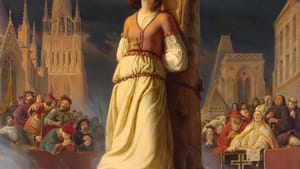Stay in the Loop
BSR publishes on a weekly schedule, with an email newsletter every Wednesday and Thursday morning. There’s no paywall, and subscribing is always free.
Prayer in public: Be careful what you wish for
What hath the Supreme Court wrought?

The U.S. Supreme Court ruled last week that it’s OK for a town in upstate New York to open its council meetings with prayers that acknowledge “the saving sacrifice of Jesus Christ on the cross.” This 5-4 decision set off major celebrations within America’s religious right. The Court’s decision “wasn’t just an answer on prayer,” read a jubilant statement by the Family Research Council. “It was an answer to prayer!”
If I belonged to the Family Research Council — and, granted, no one from the Council has rung my phone — I would hold off on the confetti and kazoos. Supreme Court decisions have a way of backfiring on their supporters, especially those that lack a broad consensus, not to mention common sense. The Court’s Citizens United decision in 2010 unleashed an unlimited torrent of corporate (read: mostly Republican) spending on campaign ads in the 2012 presidential election, but it also triggered such widespread resentment of all that obscene spending that the Democratic candidate, Barack Obama, won the election.
Roe v. Wade legalized abortion in 1973 but failed to persuade any abortion foes to change their minds, with the result that abortion is more bitterly disputed now than it was then. Plessy v. Ferguson, which approved racial segregation in 1896, didn’t exactly resolve that issue for all time. Ditto for Dred Scott, which in 1857 defined slaves as private property. James Buchanan, who was president at the time, hoped the Dred Scott decision would settle the divisive slavery question once and for all. We know how that turned out.
Town of Greece v. Galloway could conceivably usher in a new era of public piety across America, as the Family Research Council hopes. “If I understand this [ruling] correctly,” a county commissioner in Lincoln County, N.C., observed at a board meeting last week, “now any government can pray to the Lord, to Jesus — however you want to pray, you can pray!”
On the other hand, in the same county in the same week, a City Council member opposed a motion to ask clergy members to open council meetings with prayers. “Are you going to sit here and have a Hindu pray to Mohammed or whomever?” he asked rhetorically.
My Penn fraternity
As for me, I can’t help recalling Phi Sigma Delta, my fraternity at Penn. Our Phi Sig chapter at the dawn of the rebellious ’60s was what might best be described as a Jewish animal house, which was not at all what the adults who ran the national fraternity had in mind. To be sure, the notion of reforming the archaic rituals imposed on us by our national fraternity never occurred to us. Instead, we simply ignored the rituals, or we carried them out to ridiculous extremes in the best tradition of Jaroslav Hašek’s Good Soldier Schweik.
For example, the national fraternity decreed that all chapter meetings must be opened with a reading from the Bible. Our chapter scrupulously honored this rule by reading each month one of the Bible’s lewdest and most lascivious passages, of which there are plenty. Two of our favorites, as I recall, were “And Onan knew that the seed should not be his; and it came to pass, when he went in unto his brother's wife, that he spilled it on the ground, lest that he should give seed to his brother” (Genesis 38:9) and “This thy stature is like to a palm tree, and thy breasts to clusters of grapes” (Song of Solomon 7:7).
Once, at a chapter meeting, one of my fraternity brothers objected that this horseplay was sacrilegious and hypocritical, and he made a motion to discontinue the Bible readings. There followed a spirited and amusing debate, as some of the brothers declaimed with mock seriousness on the need for religion in fraternity life, and others insisted that lampooning the Bible was an essential element of fraternity fun. Our chapter president, recognizing an entertaining diversion when he saw it, allowed the discussion to continue until it began to drag, at which point he cut it off simply by telling us that the matter was out of our hands and we might as well proceed with other business.
So, the Supreme Court has spoken on prayer at public meetings, just like the national fraternity of Phi Sigma Delta. The way is now clear for Hindus to pray to Muhammad in Lincoln County, N.C. For that matter, previously boring public meetings can now be livened up by sectarian disputations, druid incantations, Spanish inquisitions, Mayan sacrifices of animals and virgins, burnings of nonbelievers at the stake, and colorful murals of the Last Judgment on courthouse ceilings.
What better way to entice apathetic Americans away from their iPads and into the serious business of government? Let the fun begin.
Sign up for our newsletter
All of the week's new articles, all in one place. Sign up for the free weekly BSR newsletters, and don't miss a conversation.

 Dan Rottenberg
Dan Rottenberg